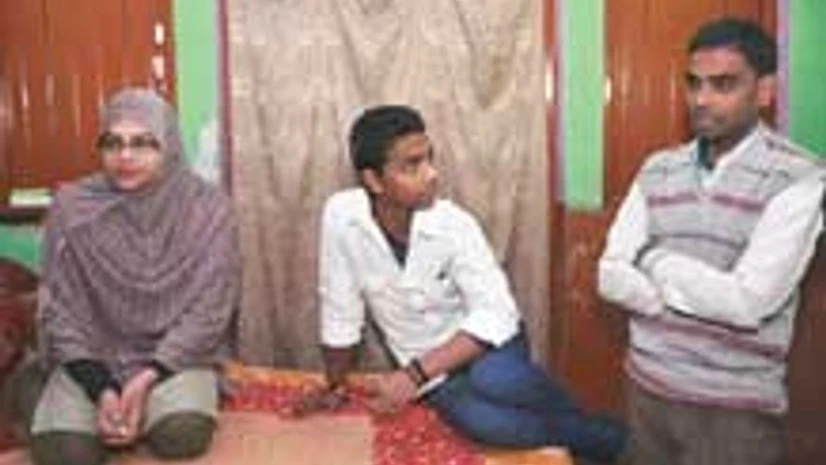The best-kept secret in the Alam family is Tanzeer has a girlfriend. He doesn't mention it at home due to circumspection from being the youngest in a family of six. The oldest brother, 25, wants to marry but says "Pehle behno se nipat jayen (let me marry off the sisters first)".
Tanzeer Alam, officially 18 but less certain of his age otherwise, smiles with the rest of the family when his oldest sibling mentions the sisters. It is not clear if he shares this sense of responsibility.
Take him out of his tiny two-room residence (a bed is shared by three) and his reticence fades.
More From This Section
Anwar smiles indulgently as the youngster answers questions. "Yes, he is good at that work (flirting), takes leave," said Anwar, whose brass business has an annual turnover of Rs 3 crore.
At home, Tanzeer wears a crisp, white shirt with a certain attitude and is much better dressed than his siblings. He checks his age with his sister, Soni Parveen, who has a bachelor's degree from Moradabad's Hindu College. Despite being the most educated and the most articulate among the six siblings, Parveen does not go out of the home to work. She feels her gender prevents her from doing so. "What will people say?" she ponders.
Parveen last worked in the government's pulse polio programme, earning Rs 75 a day. She recalls how she had to repeatedly visit families if the child was away.
'Religious addiction'
The area where the Alam family lives is what is called "Muslim-dominated". Just behind them is the Hindu area - in this case, equally deprived. Electricity in these small houses has been off since two in the afternoon, and re-connects at eight at night.
The Alams prepare for their interview with generosity and effervescence, despite the cramped living space. Parveen makes her brothers unpack bone-china plates in which she serves large pastries, biscuits and chiwda. She uses a hand-pump inside the house to make tea.
Tanzeer has had to drop out of school to join the brass industry - which used to be dominated by members of his community.
Moradabad is a small town with big aspirations; hoardings are up of its own half-marathon, with corporate sponsors. It is the traditional hub of India's brass business, with an annual turnover of Rs 3,500 crore. It is also one of the towns in Uttar Pradesh where communal tension flared bloodily in Muzaffarnagar.
The three Alam men - two older brothers shape brass utensils on machines, the youngest polishes and packs brass, aluminum and steel show pieces, vases, and ash trays - say business has slipped from Muslims.
"Small businessmen are now workers in other people's factories," said the oldest Alam, holding the rising costs of brass responsible for this. Though there is no data to support this theory, it is a view the much better - off Anwar shares.
"If you read the names of brass businesses, Muslims are less than earlier," said Anwar, who sports a cap and beard but is dressed otherwise as a confident businessman.
Historian Irfan Habib, who taught at Aligarh Muslim University for four decades, says the shrinking of Moradabad's brassware business or Aligarh's lock-making due to globalisation has affected Hindu and Muslim enterprises alike.
Anwar's Rs 3-crore-a-year factory is approached by narrow lanes.
"Musalmano ki galiyan tang hi hoti hain," said Anwar, his voice laced with sarcasm. He saw the 1980 Moradabad riots. He blames the economic push back on his community for its physical squeeze.
Habib is unwilling to accept the economic pushback here as well. He says the demarcation of Hindu and Muslim areas is due to 'religious addiction'. "You build a temple or a mosque in your locality, have a loudspeaker and feel comfortable surrounded by your own."
Modern Muslims
A few are aware of this tendency to look inward which can prevent growth. Activist Saleem Baig wants the government to lend a hand to pull Muslims up. He has campaigned to find why programmes funded by the Union ministry of minority affairs are not reaching Muslims.
It is the young such as Tanzeer, though, who may turn out to be flag bearers of the community's need and desire to change -with or without institutional help.

)
